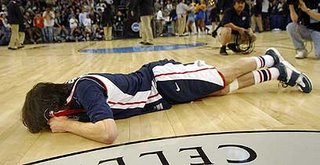A wise person once said, “Tears are a sign of life.” If that’s true, then Adam Morrison is really alive.
Nobody east of the Rockies was more excited about UCLA’s victory last night than I was. (Nobody was more angry, either, when the realization washed over them that the Texas Longhorns game would be on the television instead of the Bruins.) I was able to follow the game on the computer, living and, mostly, dying with each Gonzaga basket. And there were plenty of them. In fact, halfway through the game I got a voice mail from my brother who called the Bruins’ effort a “travesty” but encouraged me to stay the course. It was that bad. And I felt bad. But, then…
UCLA made it a game in the second half, cutting into the lead early and then hanging around. In the final three minutes, things just got ridiculous. Seemingly out of nowhere, the Bruins began forcing turnovers and hitting shots that just refused to fall in the first half. Which led us to this sequence: Morrison received an inbounds pass with nineteen seconds left, was effectively covered and threw a pass across the court to teammate J.P. Batista. UCLA succeeded in stealing the ball and hitting a layup to take the lead. That was at eight seconds. Gonzaga inbounded the ball, but had it stripped again and UCLA fell on it with two seconds left. The Bruins had been down by as many as 17 and were trailing by 9 with three minutes left, but now found themselves in the lead, 72-71. And that’s when Adam Morrison proved his heart was beating.
You may know Morrison as the man with the ugliest mustache in college sports. Perhaps it’s the silly late-70s socks that catch your attention. What I noticed at that moment, with two seconds left, was that he was crying. Yes, tears. Crying before the game was even over. It only precipitated (no pun intended) the flood that would come after the game went final and Morrison collapsed at center court with his jersey pulled over his head. His shoulders were heaving and I couldn’t help but feel a little badly for him. Here was the nation’s leading scorer reduced to a puddle. His team lost, and he was overcome.
So, here’s the thing: A friend told me that today on the sports radio Mor
 rison was raked over the coals for crying before the game was over. And for crying after the game was over. Apparently, there’s no crying in basketball. When I pseudo-defended Morrison—I said I had no problem with the post-game “our season is over” tears, but was not really down with the in-game, “we’re now down by one point with two seconds left” tears—my friend even hated on the post-game flow.
rison was raked over the coals for crying before the game was over. And for crying after the game was over. Apparently, there’s no crying in basketball. When I pseudo-defended Morrison—I said I had no problem with the post-game “our season is over” tears, but was not really down with the in-game, “we’re now down by one point with two seconds left” tears—my friend even hated on the post-game flow.So, I put it to you: What do you do with an athlete that cries after or during a loss? Do you prefer your stars to be emotionless? Is it only okay to cry after a win? Why do we need our stars to play dry?
If you need to see it for yourself before you weigh in, go to CBS Sportsline and click on UCLA: Unbelievable!
Fire away. I’d love to hear your thoughts.